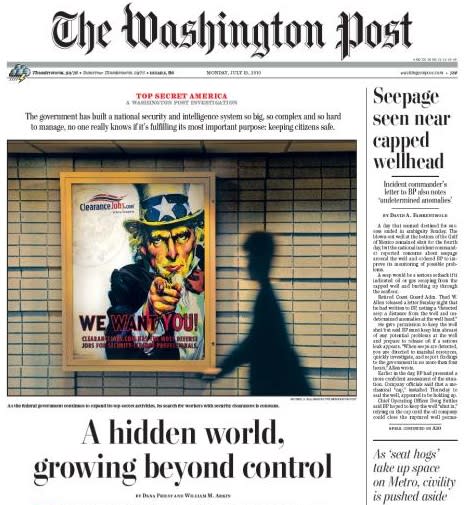 The Upshot
The UpshotWashington Post editor defends publishing intelligence-complex exposé

The Washington Post’s major investigation of government contractors and the intelligence community, complete with interactive database, has been called a “roadmap to our enemies” by one administration official.
But Post executive editor Marcus Brauchli disagrees.
Brauchli, in an interview with The Upshot, defended the piece's publication and said that editors took national security concerns into consideration.
“Whenever we believe our reporting may imperil national security or public safety, we seek input from the government or other industries that may be affected, so we can make sound judgments about what to publish,” Brauchli said.
Newspapers have long clashed with the government over national security investigations. The debate typically hinges on the public's right to know versus the government's argument that secrecy is needed at times to protect the public. This story was no exception.
The Post previewed the piece for government officials
High-ranking government officials visited the Post in recent months to view some of the the work of reporters Dana Priest and William Arkin (along with contributions from a team of staffers). The Post removed “certain data points” at one government body’s request, according to an editor’s note. The Post decided to keep the project's interactive website despite another agency’s objections.
Brauchli wouldn’t elaborate on specific objections raised but clearly believes the Post was right to publish “Top Secret America.” (The Upshot’s cheat sheet of top revelations in the first installment is here).
"It's an important piece of journalism, and I think it goes to an issue that is of great importance to the country," he said.
The piece has been a long time coming; early meetings started in August 2008. And it’s largely been kept under wraps — even inside the newsroom. The first installment wasn’t available internally to staff before it went online early Monday morning, according to sources.
But hype has been building in recent days, largely due to government officials leaking details and the fact that Dana Priest’s byline is attached to the project. She's won two Pulitzer Prizes in recent years for pieces that had significant impact — exposing secret CIA prisons and the treatment of soldiers at Walter Reed Army Medical Center. Priest teamed up this time with Arkin, a veteran military and national security journalist who has previously written for the paper and the Post’s website (and is currently under contract).
A rollout campaign designed for maximum impact
After years of work, the Post is making sure this lengthy (and presumably costly) investigation gets attention.
Priest and Arkin hit the morning shows Monday, with stops at “Today,” “Good Morning America,” and “Morning Joe.” In addition to interactive Web features, the Post also launched a Twitter feed and Facebook page to accompany the investigation.
“The website, I think, is a model of what you might call Journalism 2.0,” Brauchli said, adding that the Web version provides information in “a way we couldn’t possibly do in a standard prose article.”
He said the Post tried to create a website for this project that would “provide the most comprehensive, granular presentation possible of this enormous, sprawling national security enterprise — to give readers a real feel of how large it has become, how widespread it has become, how far into small communities around the country it reaches.”
Regarding tapping into sites like Facebook, Brauchli said the Post has “been sort of pioneers in the use of social media among mainstream news organizations.”
Brauchli acknowledged that Monday is the best time to drop such a big story. It’s both when the Post’s online traffic peaks and when the news cycle really kicks into high gear.
He declined to speculate on the costs of this massive project — one that may seem less likely with all the recent newspaper industry cutbacks. (The Post itself has gone through four buyouts since 2003.) However, Brauchli scoffs at the notion that investigative journalism is on the decline these days.
“The Washington Post is deeply and fundamentally and existentially committed to strong accountability journalism,” he said.

